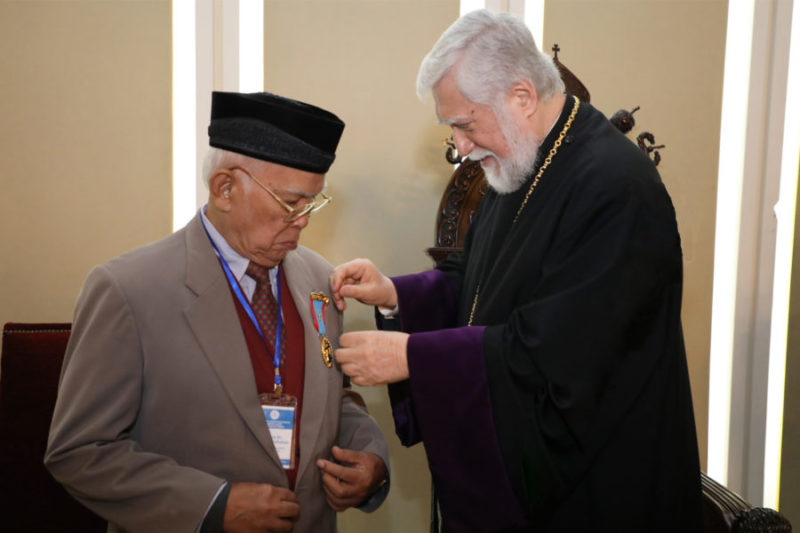Asian ecumenical leader Dr Soritua Nababan awarded ’Mesrop Mashtots’ medal by Armenian Catholicos of Cilicia

Asian ecumenical leader Dr Soritua Albert Ernest Nababan has been awarded the St Mesrop Mashtots medal by the Armenian Church Catholicos of Cilicia, His Holiness Aram I.
In the presence of prominent global ecumenical leaders as well as representatives of the Armenian community who were present at the special event held at the Armenian Catholicosate of the Great House of Cilicia, Lebanon, on 1 February 2020, the Pontiff of the Holy See of Cilicia presented the medal to Dr Nababan and recollected his leadership in the ecumenical movement at various levels.
Dr Soritua Nababan, a former Ephorus (Archbishop) of the Huria Kristen Batak Protestan (HKBP) in Indonesia, the largest protestant church in the country, has been involved in the ecumenical movement in Indonesia, Asia, and at the global level in various capacities. He was the first youth secretary of the East Asia Christian Conference, the precursor to the Christian Conference of Asia (CCA), and was subsequently elected a President of the CCA (1990–1995). In the World Council of Churches (WCC), Dr Nababan served as a member of the WCC’s Youth Committee in the 1950s, Moderator of the WCC’s Commission on World Mission and Evangelism in the 1970s, and a member of the WCC Central Committee at different times.
Catholicos Aram I has served two terms as the Moderator of the WCC’s Central Committee, and during his first tenure, Dr Nababan was the Vice Moderator.
The prestigious St Mesrop Mashtots award was constituted by the Armenian Church Catholicosate of Cilicia to honour prominent persons in church and society in recognition of their life-long contributions.
St Mesrop Mashtots (360-440 AD) was a monk, theologian, and linguist who, according to tradition, invented the Armenian script in 405 AD and helped establish Armenia’s golden age of Christian literature.
Mesrop Mashtots began a monastic existence around 395 AD, was ordained a priest, maintained life-long esteem for the ascetic life, and founded several monasteries. He spread the Gospel in remote areas of Armenia and suppressed Mazdaism, a religious order that descended from Zoroastrianism, and invented the definitive 36-character Armenian alphabet.
CCA General Secretary Dr Mathews George Chunakara, who was also present at the special event in Lebanon, expressed happiness on the recognition of Dr Nababan, and conveyed best wishes to him on behalf of the Asian ecumenical family.
Dr Mathews George Chunakara stated that Dr Soritua Nababan is a living example of articulating Asian ecumenical identity and Asian contributions to the global ecumenical movement during his interactions over the decades. The CCA General Secretary added that the recognition of Nababan by the Armenian Catholicosate of Cilicia is a great honour bestowed upon this octogenarian Asian ecumenical leader.
In accepting the prestigious St Mesrop Mashtots award, Dr Soritua Nababan told the gathering that he was deeply moved by the honour conferred upon him, and always admired the charismatic leadership and ecumenical commitment of His Holiness Aram I, who has been accepted and recognized by the global ecumenical community as a staunch ecclesial and ecumenical leader of this century.
Rev. Dr Samuel R. Kobia, a former General Secretary of WCC, was also awarded the St Mesrop Mashtots medal during the same occasion.
Rev Dr Konrad Raiser, a former General Secretary of WCC, who attended this special event, was also a recipient of the Mesrop Mashtots award in 2003.










